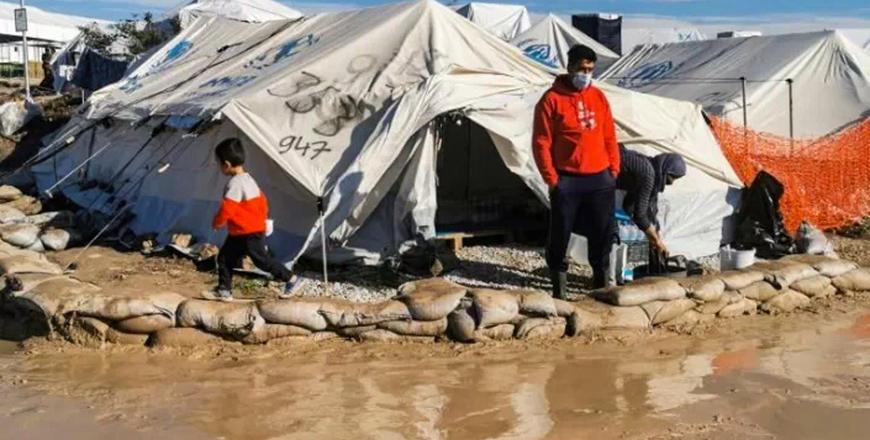You are here
Greece inaugurates its first ‘closed’ camp for asylum seekers
By AFP - Sep 18,2021 - Last updated at Sep 18,2021
SAMOS, Greece — Greece on Saturday inaugurated the first of five new “closed” migrant camps, opposed by rights groups who say the strict access measures are too restrictive.
Barbed wire fencing surrounds the new camp on the island of Samos, which is also installed with surveillance cameras, x-ray scanners and magnetic doors.
The EU has committed 276 million euros ($326 million) for the new camps on Greece’s five Aegean islands — Leros, Lesbos, Kos, Chios as well as Samos — that receive most of the migrant arrivals by sea from neighbouring Turkey.
The Samos camp, which will serve as a pilot for the other so-called closed and controlled access facilities, has a detention centre and asylum seekers will only be able to go in by scanning their fingerprints and electronic badges at the entrance.
Gates will remain closed at night and those who don’t return before 8.00pm will face disciplinary sanctions.
The camp boasts sports and games areas, as well as shared kitchens.
Dormitories have five beds each and a cupboard, with shared toilets and showers, an AFP team saw.
“The new closed-controlled access centre will give back the lost dignity to people seeking international protection, but also the necessary conditions of safeguarding and restraint for illegal migrants who are to be returned,” Greek Migration Minister Notis Mitarachi said at the opening.
Living conditions
The Leros camp is expected to be finished next month, while on Lesbos — home to Moria, Europe’s largest camp, which was destroyed by fire last year — work has yet to begin.
With better quality accommodation, running water, toilets, separate areas for families and more security, the Greek government says that the camps will meet European standards.
They replace previous facilities that became infamous for their living conditions.
On Samos, the facility near the port of Vathy had been designed for about 680 people but at one point was home to nearly 10 times that number.
Asylum seekers still live there — rats, improvised wooden barracks without heating and a lack of toilets and showers continue to be part of their daily lives.
But from Monday, residents will be transferred to the new facility some 5 kilometres from Samos’s main town of the same name.
The old camp will be closed by month’s end, according to the migration ministry.
And the Greek army will dismantle the buildings, remove the containers and de-contaminate the area, which will then be passed on to the municipality.
“This is a promise to the local community, but also a commitment of our ministry,” Mitarachi has said, responding to anger among the local community who, for years, watched as the camp ballooned on the outskirts of their village.
‘Camps should be open’
NGOs and aid groups however have raised concerns about the new camps’ structure in isolated places and residents’ confinement.
Last week, dozens of NGOs, including Amnesty International, accused Greece of pursuing “harmful policies focused on deterring and containing asylum seekers and refugees”.
Some 45 NGOs and civil society groups urged the EU and Greek government to abandon plans to restrict the movement of people in the camps.
In a report, they said the new structures “will impede effective identification and protection of vulnerable people, limit access to services and assistance for asylum seekers, and exacerbate the harmful effects of displacement and containment on individuals’ mental health”.
The UN refugee agency’s representative in Greece also expressed reservations.
“The word ‘closed’ comes up often and this is concerning,” Mireille Girard said, adding “asylum seekers need protection, they are not criminals or a risk for the community, they are people who need help.”
“For us, camps should be open. The government has assured us that they will be.”
Greece was the main point where more than one million asylum seekers — mainly Syrians, Iraqis and Afghans — entered Europe in 2015.
The crisis in Afghanistan has prompted fears of a new migration wave.
Mitarachi said this week that the flow of new arrivals had been reduced by 90 per cent compared to 2019.
However, humanitarian organisations say the drop is due to systematic and illegal pushbacks of migrants to Turkey by Greek authorities which Greece’s conservative government has repeatedly denied.
Related Articles
LESBOS ISLAND, Greece — The European Union said on Monday that Turkey must “urgently” resume accepting migrants from Greece, where thousands
ATHENS — Greek Migration Minister Notis Mitarachi has called on Turkey to take back 1,450 migrants to demonstrate “willingness to cooperate”
LESBOS ISLAND, Greece — Pope Francis on Sunday returned to the island of Lesbos, the migration flashpoint he first visited in 2016, calling













